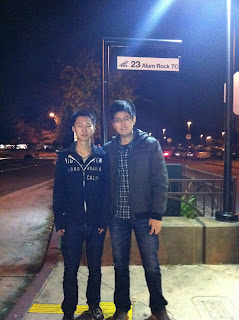“You take the blue pill – the story ends, you wake up in your bed and believe whatever you want to believe. You take the red pill – you stay in Wonderland and I show you how deep the rabbit-hole goes,” Morpheus explains to Neo, who has no clue what will be coming to him if he takes the red pill. But, being someone who thinks that he has nothing to lose, Neo has to satiate his curiosity. How would he know that he’d wake up in such a hellish future? I’d say he was tricked by Morpheus, who almost had too much faith in Neo (who thankfully IS “The One”). Now, would I take the blue pill or the red pill if I were put into the same situation as Neo? Obviously, taking the blue pill wouldn’t change my lifestyle one bit. On the other hand, let me predict what will happen to me if I take the red pill.
Although taking the red pill is just what Neo did in The Matrix, first off I must be realistic and say that I may not be as fortunate as Neo if I do the same. After all, he is the hero of an epic story, which might not necessarily be me. As seen from the film, taking the red pill will kick me awake from ignorant bliss and into a world where I am nothing but a battery. What will come then is bewilderment, shock, and despair. It is not until Morpheus and the others allow me to understand me their “fight” and my part in that fight that there will be any hope left in my heart. Their lifestyle is one of hiding, eating disgusting vitamin goop every day, living in a claustrophobic ship and nonstop life-threatening missions. The red pill doesn’t sound like a good deal to me at all. Even if I knew that I were to become “The One,” I’d still hesitate putting such responsibility upon myself. Plus, Neo loses Trinity and supposedly dies at the end of the trilogy... he is a hero, yes, but in truth, who really wants to be a martyr?
On the contrary, assuming that I didn’t know what would happen if I take the red pill, I would probably take it, based on my personality. Although “ignorance is bliss” and I may feel better off living in a situation like Plato’s “Cave” or North Korea (I just had to add this in), since I can be happy as long as the world is what I believe it is, I would rather know the truth than be a slave. Thinking back to what Morpheus said, and how I wrote that he tricked Neo into eating the red pill, I now actually kind of know where he is coming from.
Life can be tough though, and people often try to escape it with actions like watching movies, taking drugs, or even denial. Not all these temporary escapes are bad, but if one tries to escape too much they typically end up ignoring too many things and arrive at where they don’t want to be. Then again, the Matrix is something that probably many would rather be than face a world run by robots. The film explores controversial subjects not only such as human beings dabbing in and creating AI; it also explores the definition of “reality.” People are unknowingly part of a simulation system and can “thrive” within (based on what they feel, not what they physically are – a battery), and even for those who know the truth about the Matrix, some such as Cypher would rather return to living in the dream.












